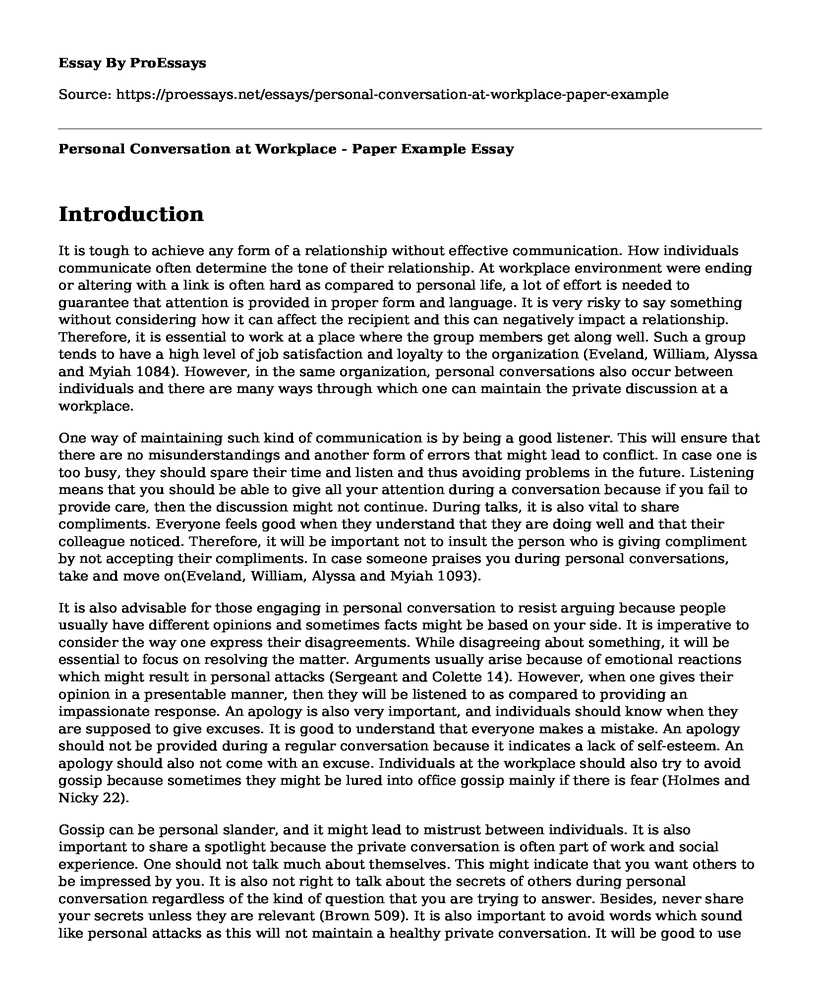Introduction
It is tough to achieve any form of a relationship without effective communication. How individuals communicate often determine the tone of their relationship. At workplace environment were ending or altering with a link is often hard as compared to personal life, a lot of effort is needed to guarantee that attention is provided in proper form and language. It is very risky to say something without considering how it can affect the recipient and this can negatively impact a relationship. Therefore, it is essential to work at a place where the group members get along well. Such a group tends to have a high level of job satisfaction and loyalty to the organization (Eveland, William, Alyssa and Myiah 1084). However, in the same organization, personal conversations also occur between individuals and there are many ways through which one can maintain the private discussion at a workplace.
One way of maintaining such kind of communication is by being a good listener. This will ensure that there are no misunderstandings and another form of errors that might lead to conflict. In case one is too busy, they should spare their time and listen and thus avoiding problems in the future. Listening means that you should be able to give all your attention during a conversation because if you fail to provide care, then the discussion might not continue. During talks, it is also vital to share compliments. Everyone feels good when they understand that they are doing well and that their colleague noticed. Therefore, it will be important not to insult the person who is giving compliment by not accepting their compliments. In case someone praises you during personal conversations, take and move on(Eveland, William, Alyssa and Myiah 1093).
It is also advisable for those engaging in personal conversation to resist arguing because people usually have different opinions and sometimes facts might be based on your side. It is imperative to consider the way one express their disagreements. While disagreeing about something, it will be essential to focus on resolving the matter. Arguments usually arise because of emotional reactions which might result in personal attacks (Sergeant and Colette 14). However, when one gives their opinion in a presentable manner, then they will be listened to as compared to providing an impassionate response. An apology is also very important, and individuals should know when they are supposed to give excuses. It is good to understand that everyone makes a mistake. An apology should not be provided during a regular conversation because it indicates a lack of self-esteem. An apology should also not come with an excuse. Individuals at the workplace should also try to avoid gossip because sometimes they might be lured into office gossip mainly if there is fear (Holmes and Nicky 22).
Gossip can be personal slander, and it might lead to mistrust between individuals. It is also important to share a spotlight because the private conversation is often part of work and social experience. One should not talk much about themselves. This might indicate that you want others to be impressed by you. It is also not right to talk about the secrets of others during personal conversation regardless of the kind of question that you are trying to answer. Besides, never share your secrets unless they are relevant (Brown 509). It is also important to avoid words which sound like personal attacks as this will not maintain a healthy private conversation. It will be good to use simple terms while communicating to be clear as no one wishes to hear complex terminology while they are having a personal interview.
Work Cited
Brown, Natalie. "WIL [ling] to share: an institutional conversation to guide policy and practice in workintegrated learning." Higher Education Research & Development 29.5 (2010): 507-518.
Eveland Jr, William P., Alyssa C. Morey, and Myiah J. Hutchens. "Beyond deliberation: New directions for the study of informal political conversation from a communication perspective." Journal of Communication 61.6 (2011): 1082-1103.
Holmes, Janet, and Nicky Riddiford. "Professional and personal identity at work: Achieving a synthesis through intercultural workplace talk." Journal of Intercultural Communication 22 (2010).
Holmes, Janet, and Maria Stubbe. Power and politeness in the workplace: A sociolinguistic analysis of talk at work. Routledge, 2015.
Sergeant, Jenny, and Colette Laws-Chapman. "Creating a positive workplace culture." Nursing Management (through 2013) 18.9 (2012): 14.
Cite this page
Personal Conversation at Workplace - Paper Example. (2022, Jul 18). Retrieved from https://proessays.net/essays/personal-conversation-at-workplace-paper-example
If you are the original author of this essay and no longer wish to have it published on the ProEssays website, please click below to request its removal:
- Characteristics of the Perfect Manager Essay
- Step On It Intervention Essay
- Paper Example on Sports Massage Profession
- Essay Example on HRM Theories: Performance and Quality Care For Success
- Essay Example on Financial Economics: A Journey of Knowledge and Career Goals
- Essay Example on Dreams to Reality: Exploring the Bridges to Success Program
- Essay on Maximizing Profits in Challenging Economic Times: Understanding Internal Factors







